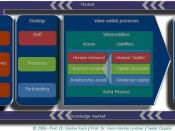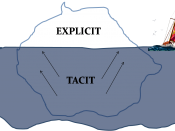The idea of viewing organizational knowledge as a priceless asset to organizations has been popularized by management teams and organization theory scholars for a long time. Organizations understand that in order to stay competitive in the market, they must effectively and efficiently generate, disseminate, apply, and protect the organizations' knowledge, and have the capability to use that knowledge on specific problems and opportunities encountered. Even though lots of organizations realize the importance of knowledge management and are applying strategies on managing knowledge, but organizations are still losing knowledge unintentionally. In the era where knowledge workers are the core composition of an organization, tacit knowledge is the main knowledge resource. The tacit knowledge circulated into explicit knowledge and recorded in knowledge managing system only represents a small portion of the entire tacit knowledge an organization has. Several other contingencies or applied organizational strategies can significantly reduce the tacit knowledge within an organization before it is remembered.
Most organizations are unaware of the knowledge they have already accumulated. Every time a task is accomplished, a certain amount of knowledge is gained. However, if opportunities or problems never take place, the tacit knowledge will remain unstated. As employees turnover or retire, the valuable knowledge and experience that was not recorded disappears. In GE, the method of "action learning teams" is being applied to improve this particular situation. Similar to mentoring, inexperienced employees are put together in a project team with experienced colleagues. This approach encourages people to learn a lot about a lot of things. Moreover, it creates more opportunities for tacit knowledge to flow within the organization.
Empowerment has been a popular concept within organizations, particularly within organizations that are considered to be organic. Organizations that have the organic structure want to keep up with the changes and adapt to the uncertain...


